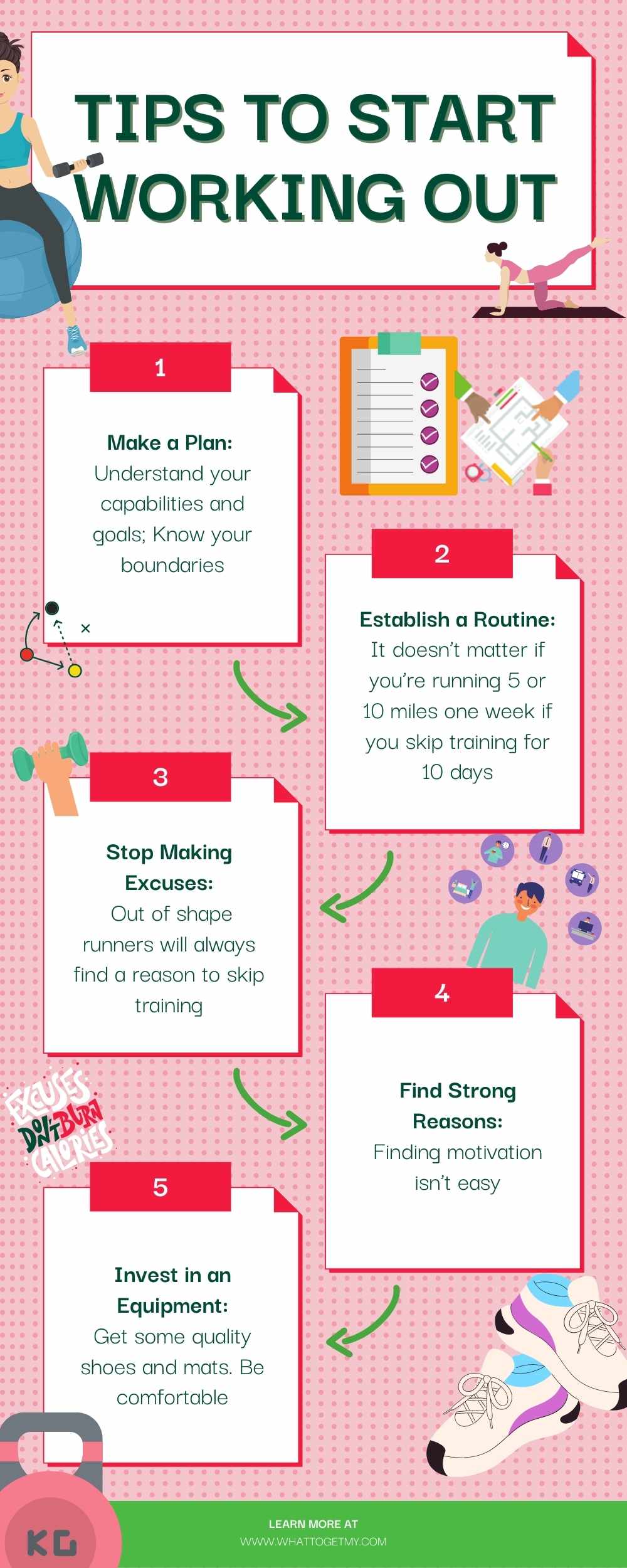How to Start Running If You are Out of Shape?
WhatToGetMy Instructional Article
You want to get back in shape and start exercising? If jogging seems like the thing you want to do, we have good news for you! We’ve prepared some advice on how to start running if you are out of shape. All you need is enthusiasm and a strong motivation to exercise.
There are probably a lot of questions on your mind, from the running pace to the adequate equipment. We’ll try to answer most of them, especially the important one “How to start”. Remember that running is for everyone, regardless of age or fitness level. You just need quality information and a little boost, so we’re going to give you exactly that.
Before you get to the article, we’d like to mention a few things:
- Running communities are very supportive and welcoming of new members. It might be a good idea to connect with your local runners. They’ll give you useful tips and encourage you to join them in their training.
- As with any sport, remember to always stay hydrated. You mustn’t risk your health with insufficient water intake.
- If you’re really struggling and the tips below don’t help, consider hiring a fitness instructor. He/she will help you to get in shape and fall in love with exercise and running!

Source Link: https://whattogetmy.com/how-to-start-running-if-you-are-out-of-shape/
Make a running plan
Your capabilities and goals
 The first thing you should do is make a plan. Take into account your physical capabilities and even your mood. That way you can set realistic goals. You can’t expect to run a 5k race in just two weeks, right? You can’t learn how to get in running shape in 2 weeks, so start slowly with small steps. Getting into shape requires time and patience.
The first thing you should do is make a plan. Take into account your physical capabilities and even your mood. That way you can set realistic goals. You can’t expect to run a 5k race in just two weeks, right? You can’t learn how to get in running shape in 2 weeks, so start slowly with small steps. Getting into shape requires time and patience.
People who used to run, but stopped and fell out of shape, also need to start slowly. Try not to overestimate yourself. Even if you used to run very far, you will experience burnout if you force yourself to start strong. Make a simple plan that gradually increases the pace and mileage.
Consider minutes and not miles
 If you’re an absolute beginner, don’t worry about how many miles you’re running. Instead, focus on the time you spend exercising. Most fitness instructors suggest 30 minutes of slow jogs three times a week. You can, of course, adapt this according to your needs. Maybe start with just 15 minutes runs? Once this becomes “too easy” increase the time.
If you’re an absolute beginner, don’t worry about how many miles you’re running. Instead, focus on the time you spend exercising. Most fitness instructors suggest 30 minutes of slow jogs three times a week. You can, of course, adapt this according to your needs. Maybe start with just 15 minutes runs? Once this becomes “too easy” increase the time.
When making a plan, include enough time in your daily schedule for getting dressed and taking a shower afterward. We suggest you set aside an hour for your training, so you don’t feel rushed.
Know your boundaries
 Learn your boundaries! Going fast and far from the start can only lead to injuries. Try to jog in the close perimeter of your home, so you can stop anytime you feel too exhausted to continue. It’s completely normal (and expected) to get tired very fast. You’re a beginner after all.
Learn your boundaries! Going fast and far from the start can only lead to injuries. Try to jog in the close perimeter of your home, so you can stop anytime you feel too exhausted to continue. It’s completely normal (and expected) to get tired very fast. You’re a beginner after all.
Also, consult a doctor to make sure you won’t experience health problems. If you’re overweight, it’s advised to start walking instead of running. You can start by walking regularly and then slowly transition to jogging. Even 20 minutes of walking has a huge influence on your health.
Rest period
 Plan rest periods in your jogs too. People who are out of shape can’t run for 15 minutes straight. Some can’t run for even 5 minutes and that’s okay! Choose your rhythm. If running for two minutes and resting for three minutes works best for you, do that! Walking is the best way to rest between running intervals. Sitting breaks aren’t advised for runners. You want to keep that heart rate up!
Plan rest periods in your jogs too. People who are out of shape can’t run for 15 minutes straight. Some can’t run for even 5 minutes and that’s okay! Choose your rhythm. If running for two minutes and resting for three minutes works best for you, do that! Walking is the best way to rest between running intervals. Sitting breaks aren’t advised for runners. You want to keep that heart rate up!
Choose your own pace
 There aren’t any rules about how fast you must run. Some people say that jogging slowly is for long distances and going faster for shorter runs. However, you just started running. First, you need to focus on getting into shape and then, about how fast/slow you’re going. For now, do what makes you comfortable!
There aren’t any rules about how fast you must run. Some people say that jogging slowly is for long distances and going faster for shorter runs. However, you just started running. First, you need to focus on getting into shape and then, about how fast/slow you’re going. For now, do what makes you comfortable!
Running apps
 If you need help with planning or you just want to keep track of your progress, definitely download a running app. There are also a lot of apps that have plans with run/walk intervals which are, as we said, recommended for beginners.
If you need help with planning or you just want to keep track of your progress, definitely download a running app. There are also a lot of apps that have plans with run/walk intervals which are, as we said, recommended for beginners.
The most popular program with intervals is “Couch to 5k”. The program varies depending on what apps you use, but the structure is pretty much the same – learn to run 5km. You start with light workouts for the first couple of weeks. Running intervals slowly increase over time and in a month or two (depending on the program), you should be able to run a 5k race (at your own pace of course).
Setting a goal such as running a 5k is a great way to keep yourself motivated. It’s an achievable goal (unlike running a marathon), so you won’t feel discouraged from the very beginning. Apps are great for keeping track of your goal. You can also use them to measure time and listen to music. Just make sure that the music isn’t too loud, so you can hear the background noise.
Treadmill
 If you don’t like outdoor running, you can always hit the gym and work out on a treadmill. You can experiment with different speeds and track your progress. Once you have more confidence, you can either increase the difficulties on the treadmill or try getting outside to explore your neighborhood.
If you don’t like outdoor running, you can always hit the gym and work out on a treadmill. You can experiment with different speeds and track your progress. Once you have more confidence, you can either increase the difficulties on the treadmill or try getting outside to explore your neighborhood.
Establish a routine
The best way to start running again is by making a plan and sticking to it. Establishing a routine is crucial. It doesn’t matter if you’re running 5 or 10 miles one week if you skip training for 10 days! All that’s important is consistency.
Include running in your daily (and monthly) schedule and make it a part of your lifestyle. The time of the day is optional. If you’re an early bird, try morning jogs and if you’re a night owl, then opt for evening runs. Just keep going! A new habit takes lots of time and energy to form, so you need to be persistent.
Stop making excuses
Out of shape runners will always find a reason to skip training. To fight the urge to quit, you need to create proper responses. We’ll show you a couple of examples of how this works, so you can try to rationally analyze any excuse that occurs.
Excuse #1
“I don’t have good running shoes.”
Of course, you need quality shoes, if you’re training for a marathon! Beginners, on the other hand, don’t need a fancy and expensive pair of sneakers. Settle for used shoes you can easily find online. As long as they are comfortable, you won’t have problems with injuries.
Excuse #2
“I’m out of shape and I’ll look strange while running.”
We’ve never heard that people judge somebody because he/she doesn’t “look like a runner”. Even if that does happen, why do you care? People you pass on the street don’t even know who you are. Sure, you can pass an acquaintance, but there’s a huge chance that he/she won’t notice you at all! If you’re really worried about this, you can run in quieter parts of the town.
Excuse #3
“Running is boring.”
Running can be boring if your workout lasts for 2 hours! Otherwise, in your 30 minutes of training, you won’t feel bored at all. You will feel tired, but that’s expected. Once endorphins kick in, you’ll forget all about exhaustion and boredom, trust us! Also, you can always listen to music or podcasts.
Excuse #4
“I hate running”
Honestly, if you really hate running, just don’t. Find other physical activities that you enjoy. However, before you “decide” that you hate running, give it a shot for a couple of weeks. Nobody fell in love with running on their first training. You might think you hate running because it feels too difficult! Get in shape first and once it becomes easier, you’ll reconsider your preferences.
Find strong reasons
Finding motivation isn’t easy. You need to think about the reasons why you want to start running in the first place. What moves you? Is it desire to be healthy? Do you want to participate in the race? Ask these questions and find your “why”. The more specific your reasons are, the better. Once you figure this out, you’re more likely to continue even if things get tough.
Preventing injuries and soreness
As we already mentioned, don’t just go straight into long-distance runs because you’ll experience burnout. You should be responsible when you’re starting a running program. Don’t force yourself to do something you’re not prepared for.
If you’re overweight, running can be very painful for your joint. Start with walking instead. You can still engage your heart, lungs, and muscles with 20-30 minute walks. As your body slowly adjusts you can start with faster walks. Once you get approval from the doctor, you can transition into jogging. However, consider asking professionals for more advice on running techniques for overweight people.
This applies to pretty much all beginners. You don’t want to risk injuring yourself because you’re not used to exercising. Push yourself to the limits but stay inside them. Slowly increase the difficulty of your training and you won’t experience leg soreness or back pain.
Also, don’t underestimate the importance of rest days. If you decided to run 3 times a week your schedule should be something like Monday-Wednesday-Friday or Tuesday-Thursday-Saturday. Never train for three days straight because your muscles need time to recover. Stretching after your runs is also very important.
Running and weight loss
Weight loss is all about calorie deficit. Simply put, you need to burn more calories than you eat. Running can help you burn calories but if you don’t change your diet, you might not get the wanted effect. People usually don’t start running again to lose weight. They just want to feel healthier and more comfortable in their bodies.
Note that if you’re running (or doing any other exercises) you mustn’t starve yourself. Muscles need protein to properly recover, so make sure to maintain a healthy diet. Balancing the percentage of fats, carbs, and proteins is better than staying away from an entire group of food.
Some people like to run on an empty stomach. However, you might feel more comfortable if you have a light meal 2 hours before you start running. Try both ways and find what works for you! Remember that if you’re running late in the evening, you should avoid eating after exercise. You’ll sleep and feel better!
Equipment
You need quality shoes once you establish a routine. For starters, you can use any old pair of shoes that you find comfortable. As you progress with your running plans, make sure you ask around to find suitable running sneakers.
Once you’re fully committed to running, don’t hesitate to spend a few extra bucks on shoes. Running shoes should complement the way your foot strikes the ground. You can find them in specialized fitness stores where you can get more advice from employees.
Other gear isn’t that necessary. Fitness trackers and smartwatches are very useful but, for beginners, that might be a big investment. A free app on your phone can track your progress perfectly. It would just be less convenient to carry a phone instead of the watch.
Conclusion
Now that you’ve learned how to start running if you are out of shape, there’s nothing stopping you! Grab a notebook and make a detailed running plan. Try to also encourage your family and friends to start running with you. You’ll be surprised how many benefits of families exercising together are there!
01 HOUR 20 MINUTES
ESTIMATED TIME DESIGNING AND UPLOADING THIS ARTICLE
07 HOURS 25 MINUTES
ESTIMATED TIME RESEARCHING AND WRITING THIS ARTICLE
You Might Also Like

12 SIGNS THAT YOU ARE INSECURE ABOUT YOUR BODY
12 SIGNS THAT YOU ARE INSECURE ABOUT YOUR BODY WhatToGetMy Instructional Article Do you ever feel self-conscious or insecure in your own body? Do you ever wonder if you could change something about your physical appearance? Growing up in a home where love was conditional,

How to Study Late at Night and Wake up Early?
How to Study Late at Night and Wake up Early? WhatToGetMy Instructional Article If you want to know how to study late at night and wake up early, we’ve got some advice for you. Time management is crucial for tackling all obstacles in front of

How to Become a Runner When You Hate Running?
How to Become a Runner When You Hate Running? WhatToGetMy Instructional Article There isn’t only one answer to the question “How to become a runner when you hate running”. We need to dig a bit deeper to solve this one. For starters, most people hate

How Can We Protect Our Health and Lengthen Our Lives?
How Can We Protect Our Health and Lengthen Our Lives? WhatToGetMy Instructional Article We were wondering how we can protect our health and lengthen our lives, so we started researching this topic. There are a lot of things we found out and we decided to

How to Get Motivated to Exercise When You’re Depressed?
How to Get Motivated to Exercise When You’re Depressed? WhatToGetMy Instructional Article Let’s start by underlining that depression is a serious illness that causes a persistent feeling of sadness and loss of interest. The best way to help yourself is to talk to a therapist.

How to Start Caring About Yourself?
How to Start Caring About Yourself? WhatToGetMy Instructional Article Taking care of yourself seems like a big task. You might not know how to start caring about yourself because it seems overwhelming. The truth is, self-care isn’t a task at all. It’s something that can


